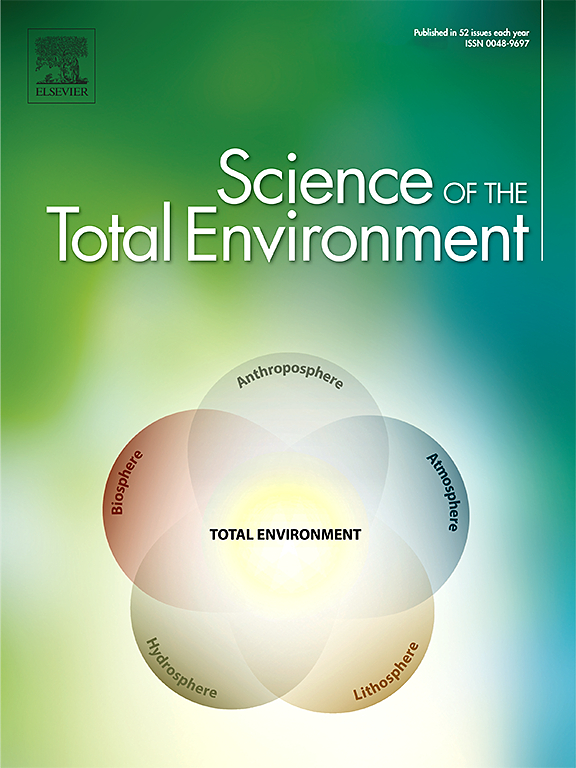农业管理措施对地中海农业生态系统中水循环、土壤侵蚀和作物产量的影响
IF 8
1区 环境科学与生态学
Q1 ENVIRONMENTAL SCIENCES
引用次数: 0
摘要
地中海农业生态系统的可持续土地管理对于保持土壤健康、优化水资源利用效率以及在气候极端事件日益增多和干旱期延长的情况下确保作物生产力至关重要。本研究评估了意大利南部主要粮食产区Cervaro河流域农业管理实践(AMPs)在缓解土壤侵蚀和改善水动态方面的有效性。利用土壤水分评估工具(SWAT+)评估了免耕、过滤带、轮作和植草水道等四种水土保持方式对土壤保持和水文过程的影响。本研究利用高分辨率综合管理和控制系统(IACS)将农业生产计划与欧盟共同农业政策(CAP)工具的关键目标结合起来,特别是在促进可持续农业实践和土壤保持措施方面。利用径流、基于遥感的实际蒸散量和大田尺度冬小麦产量数据对模型进行验证。结果表明,免耕+过滤带+轮作可减少81%的土壤流失量,提高表土保水能力,并通过改善渗流作用增加深层含水层补给。虽然AMPs导致地表径流略有增加,但作物产量保持稳定,表明其在提高环境可持续性的同时支持农业生产力的潜力。这些发现强调了靶向amp在减轻地中海和全球其他半干旱农业区的土壤流失、改善水资源管理和增强农业生态系统恢复力方面的作用。研究结果还为农业环境政策提供了基于科学的指导,特别是在CAP绿化干预和更广泛的全球可持续性倡议的框架内。本文章由计算机程序翻译,如有差异,请以英文原文为准。

Impacts of agricultural management practices on water cycle, soil erosion and crop yields in a Mediterranean agroecosystem
Sustainable land management in Mediterranean agroecosystems is crucial for preserving soil health, optimizing water use efficiency, and ensuring crop productivity under increasing climate extremes and prolonged drought periods. This study evaluates the effectiveness of agricultural management practices (AMPs) in mitigating soil erosion and improving water dynamics in the Cervaro river basin, a key grain-producing region in southern Italy. The Soil Water Assessment Tool (SWAT+) was applied to assess the impacts of four AMPs — including no-till farming, filter strips, crop rotation, and grassed waterways — on soil conservation and hydrological processes. This study utilizes high-resolution Integrated Administration and Control System (IACS) to align AMPs with key objectives of the European Union's Common Agricultural Policy (CAP) instruments, particularly in promoting sustainable farming practices and soil conservation measures.
Model validation was conducted using streamflow, remote sensing-based actual evapotranspiration, and field-scale winter durum wheat yield data.
Results indicate that integrating no-till farming with filter strips and crop rotation can reduce soil loss by 81 %, enhance topsoil water retention, and increase deep aquifer recharge due to improved percolation. While AMPs led to a slight increase in surface runoff, crop yields remained stable, demonstrating their potential to support agricultural productivity while improving environmental sustainability. These findings highlight the role of targeted AMPs in mitigating soil loss, improving water management, and enhancing agroecosystem resilience in Mediterranean and other semi-arid agricultural regions worldwide.
The results also offer science-based guidance for agri-environmental policies, particularly within the framework of CAP greening interventions and broader global sustainability initiatives.
求助全文
通过发布文献求助,成功后即可免费获取论文全文。
去求助
来源期刊

Science of the Total Environment
环境科学-环境科学
CiteScore
17.60
自引率
10.20%
发文量
8726
审稿时长
2.4 months
期刊介绍:
The Science of the Total Environment is an international journal dedicated to scientific research on the environment and its interaction with humanity. It covers a wide range of disciplines and seeks to publish innovative, hypothesis-driven, and impactful research that explores the entire environment, including the atmosphere, lithosphere, hydrosphere, biosphere, and anthroposphere.
The journal's updated Aims & Scope emphasizes the importance of interdisciplinary environmental research with broad impact. Priority is given to studies that advance fundamental understanding and explore the interconnectedness of multiple environmental spheres. Field studies are preferred, while laboratory experiments must demonstrate significant methodological advancements or mechanistic insights with direct relevance to the environment.
 求助内容:
求助内容: 应助结果提醒方式:
应助结果提醒方式:


